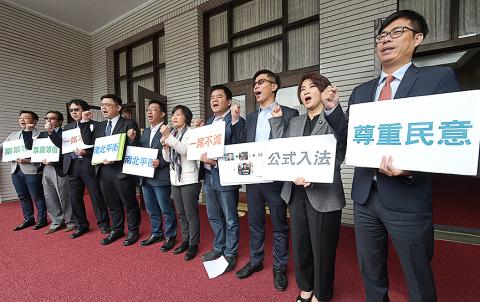The Central Election Committee’s planned adjustments to the allocation of legislative seats for the 2020 election would exacerbate the north-south divide and aggravate legislative malapportionment, Democratic Progressive Party (DPP) lawmakers told a news conference yesterday, saying constitutional reform is the sole solution.
The committee on Feb. 1 announced plans to assign one additional seat for both Tainan and Hsinchu County, while taking away one seat each from Kaohsiung and Pingtung County.
The north-south divide refers to the unequal pace of development between more urbanized northern Taiwan and the rural south, while the issue of malapportionment refers to the suspicion that a majority of electoral constituencies have been assigned to certain areas to protect some communities of interest, she said.

Photo: Chang Chia-ming, Taipei Times
The change would lead to fewer lawmakers representing Kaohsiung voters — eight lawmakers would represent 340,000 voters, instead of the current nine representing 300,000 voters — despite the city’s population not declining, she said.
A draft amendment to Article 4 of the Constitution has been cosigned by 35 lawmakers, DPP Legislator Liu Shih-fang (劉世芳) said, in which each of the 73 regional legislative seats would represent 300,000 voters, with an additional seat assigned for every 150,000 voters after that by taking one seat out of the legislator-at-large list, Liu said.
The amendment would maintain the current maximum of 113 legislative seats and would minimize the controversies caused by the two issues, she said.
DPP Legislator Chung Chia-pin (鍾佳濱) said total legislative seats is sure to decrease over the coming decade and constituencies should be drawn in proportion to area in addition to population.
Northern Taiwan has an area of 10,281km2 and a population of 9.71 million, while the south covers 25,000km2 and has 8.35 million people, and yet northern Taiwan is represented by 36 legislative seats, while southern Taiwan has 34, Chung added.
Legislative representation for Hsinchu County would be almost halved — from 550,000 per seat to 270,000 per seat — if the committee’s proposal is passed, DPP Legislator Lai Jui-lung (賴瑞隆) said, adding that compared with Lienchiang County, representing 120,000 voters per seat, it is evident that the system is problematic.
Lai called for the establishment of a more rational legislative seat apportionment via constitutional reform.
The committee’s baseless revision of electoral seats in Kaohsiung and Pingtung County would harm the concept of apportionment, DPP Legislator Chao Tien-lin (趙天麟) said, adding that he supports constitutional reform.
Apportionment is a core value of democracy and any issue guaranteed by the Constitution that is to be changed should only be changed through the Constitution, DPP Legislator Chen Chi-mai (陳其邁) said.
How legislative seats are defined, and by what equations, should be made clear and written into law, Chen said, adding that only then could anyone be satisfied that the rules are clear.
Results of the proposed changes, if tendered to the legislature’s Internal Administration Committee by May 31, would be announced by Jan. 31 next year and, if passed, used in the 2020 legislative election.

Alain Robert, known as the "French Spider-Man," praised Alex Honnold as exceptionally well-prepared after the US climber completed a free solo ascent of Taipei 101 yesterday. Robert said Honnold's ascent of the 508m-tall skyscraper in just more than one-and-a-half hours without using safety ropes or equipment was a remarkable achievement. "This is my life," he said in an interview conducted in French, adding that he liked the feeling of being "on the edge of danger." The 63-year-old Frenchman climbed Taipei 101 using ropes in December 2004, taking about four hours to reach the top. On a one-to-10 scale of difficulty, Robert said Taipei 101

Taiwanese and US defense groups are collaborating to introduce deployable, semi-autonomous manufacturing systems for drones and components in a boost to the nation’s supply chain resilience. Taiwan’s G-Tech Optroelectronics Corp subsidiary GTOC and the US’ Aerkomm Inc on Friday announced an agreement with fellow US-based Firestorm Lab to adopt the latter’s xCell, a technology featuring 3D printers fitted in 6.1m container units. The systems enable aerial platforms and parts to be produced in high volumes from dispersed nodes capable of rapid redeployment, to minimize the risk of enemy strikes and to meet field requirements, they said. Firestorm chief technology officer Ian Muceus said

MORE FALL: An investigation into one of Xi’s key cronies, part of a broader ‘anti-corruption’ drive, indicates that he might have a deep distrust in the military, an expert said China’s latest military purge underscores systemic risks in its shift from collective leadership to sole rule under Chinese President Xi Jinping (習近平), and could disrupt its chain of command and military capabilities, a national security official said yesterday. If decisionmaking within the Chinese Communist Party has become “irrational” under one-man rule, the Taiwan Strait and the regional situation must be approached with extreme caution, given unforeseen risks, they added. The anonymous official made the remarks as China’s Central Military Commission Vice Chairman Zhang Youxia (張又俠) and Joint Staff Department Chief of Staff Liu Zhenli (劉振立) were reportedly being investigated for suspected “serious

American climber Alex Honnold is to attempt a free climb of Taipei 101 today at 9am, with traffic closures around the skyscraper. To accommodate the climb attempt and filming, the Taipei Department of Transportation said traffic controls would be enforced around the Taipei 101 area. If weather conditions delay the climb, the restrictions would be pushed back to tomorrow. Traffic controls would be in place today from 7am to 11am around the Taipei 101 area, the department said. Songzhi Road would be fully closed in both directions between Songlian Road and Xinyi Road Sec 5, it said, adding that bidirectional traffic controls would